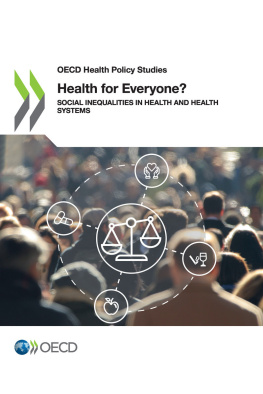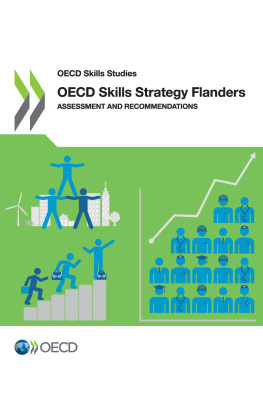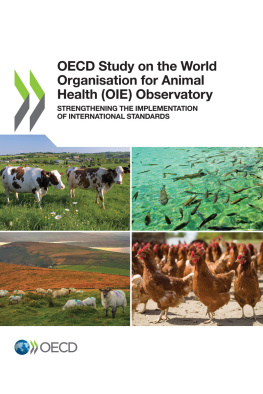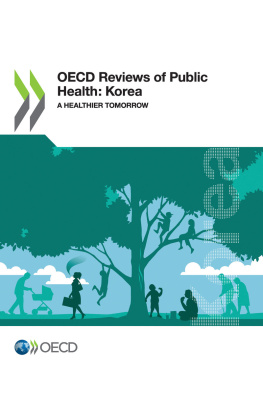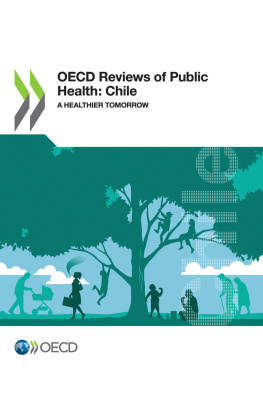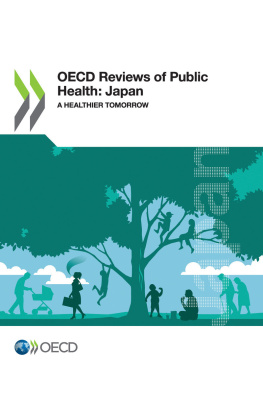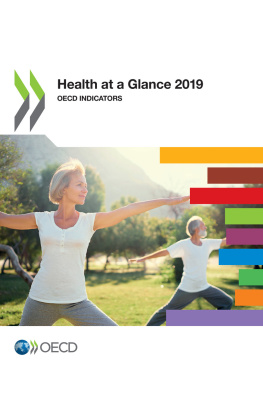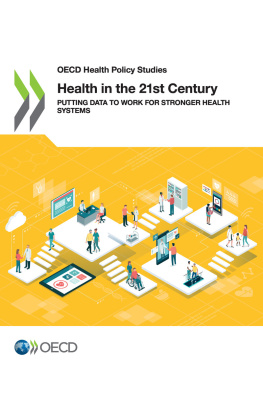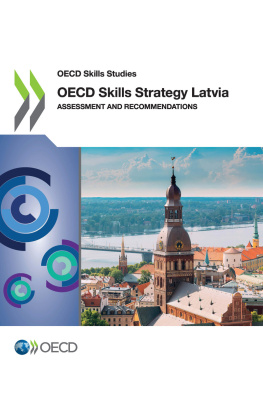OECD - Health for Everyone?
Here you can read online OECD - Health for Everyone? full text of the book (entire story) in english for free. Download pdf and epub, get meaning, cover and reviews about this ebook. year: 2019, publisher: OECD Publishing, genre: Politics. Description of the work, (preface) as well as reviews are available. Best literature library LitArk.com created for fans of good reading and offers a wide selection of genres:
Romance novel
Science fiction
Adventure
Detective
Science
History
Home and family
Prose
Art
Politics
Computer
Non-fiction
Religion
Business
Children
Humor
Choose a favorite category and find really read worthwhile books. Enjoy immersion in the world of imagination, feel the emotions of the characters or learn something new for yourself, make an fascinating discovery.
Health for Everyone?: summary, description and annotation
We offer to read an annotation, description, summary or preface (depends on what the author of the book "Health for Everyone?" wrote himself). If you haven't found the necessary information about the book — write in the comments, we will try to find it.
OECD: author's other books
Who wrote Health for Everyone?? Find out the surname, the name of the author of the book and a list of all author's works by series.
Health for Everyone? — read online for free the complete book (whole text) full work
Below is the text of the book, divided by pages. System saving the place of the last page read, allows you to conveniently read the book "Health for Everyone?" online for free, without having to search again every time where you left off. Put a bookmark, and you can go to the page where you finished reading at any time.
Font size:
Interval:
Bookmark:
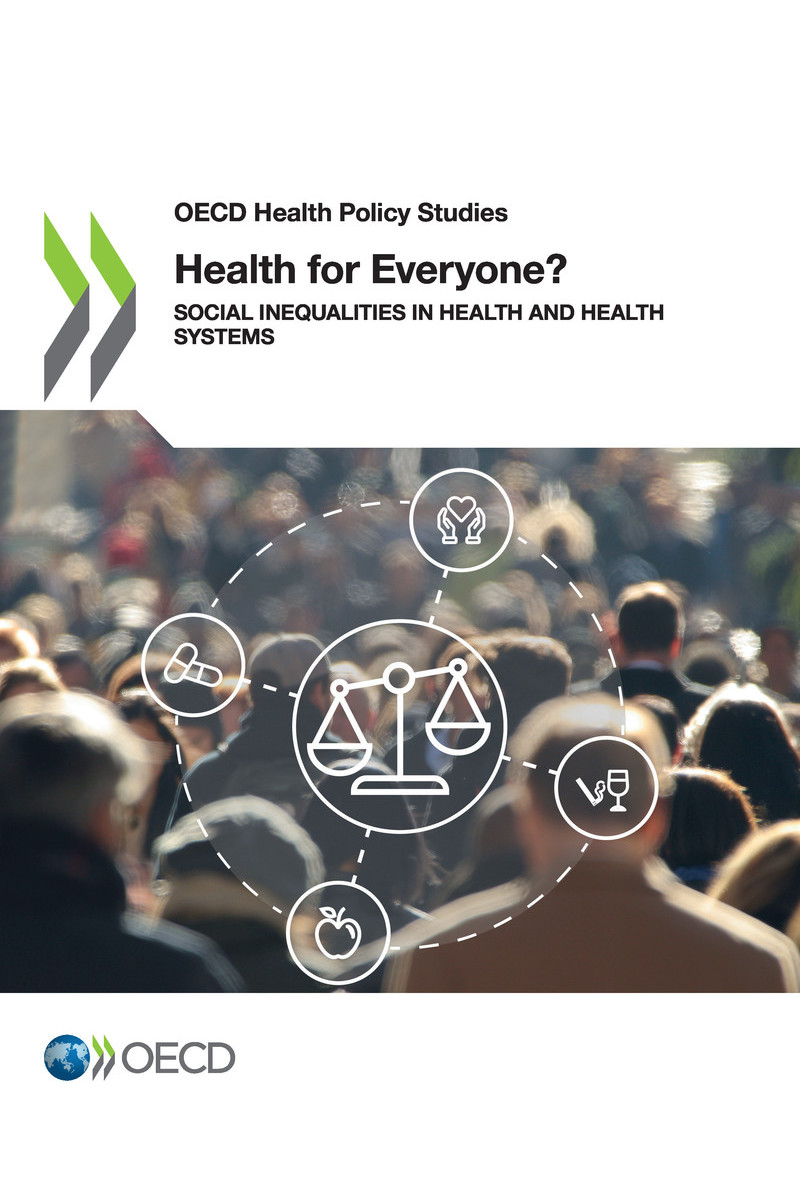
OECD (2019), Health for Everyone?: Social Inequalities in Health and Health Systems , OECD Health Policy Studies, OECD Publishing, Paris, https://doi.org/10.1787/3c8385d0-en .
Promoting a better sharing of the benefits of growth and equality of opportunities are key components of a strategy to foster social cohesion and the sustainability of economic growth. Yet, in many aspects of life, inequalities between different population groups have persisted at high level or even widened further over the last decade. Across the OECD, the top 10% of income earners now take home nearly ten times more pay than the bottom 10%. Wage inequality has reached record-high levels in some OECD countries, related to the workers skills but also type of contract. There is also a clear geographical dimension to income inequalities and job quality. And more than in the past, inequality of opportunities feeds into inequality of outcomes and vice versa reducing social mobility from one generation to the next.
Health plays a key role in shaping inequality of opportunities and outcomes. The socio-economic context in which people live affects their health. But this is not a one-way street: health is not only a result of social changes, it also drives them. If health inequality increases, so will inequality in social outcomes. For example, the difference in lifetime earnings between people in poor health and good health is the same as between low-skilled and medium-skilled workers. To address the latter, promoting access to education and training opportunities for disadvantaged groups is key to foster their employment prospects and boost economic growth more generally. However, addressing health inequality is equally important to enable individuals to aspire to a fulfilling life, but this is not always recognised. This needs to change. Making sure that people live as many years as possible in good health should not just be an argument for social justice but at the core of overarching health, social and employment policies.
The OECD Inclusive Growth agenda has long made the case for the need for policy to promote equal opportunities and address income inequalities. With Preventing Ageing Unequally the OECD examined in 2017 how the two global mega-trends of population ageing and rising inequalities have been developing and interacting, both within and across generations. The 2018 OECD publication A Broken Social Elevator? How to Promote Social Mobility has shed light on social mobility, another key angle of the inequality challenge. The report provides evidence of low social mobility across and within generations at the top and the bottom of the income ladder, particularly since the early 1980s.
Health for everyone? addresses one missing piece of the puzzle on the links between inequalities of opportunities and outcomes. A considerable body of academic studies demonstrates the existence and extent of inequalities related to health, sometimes looking at trends and/or undertaking comparisons across groups of countries but typically looking at one aspect of the issue: How is obesity distributed across social groups? Do people have equal access to care? Are the well-off in better health? This report provides evidence on health-related inequality across a range of dimensions in a large set of OECD and EU countries. The report identifies groups of countries that display higher (and lower) levels of inequality in health and health systems, setting priorities for more in-depth discussion on how to address them. Overall, the report demonstrates that if policy makers want to promote inclusive growth, increasing attention should go to ensuring that health policies benefit the least well-off.
This report was prepared by a team of the Health Division in the OECD Directorate for Employment, Labour and Social Affairs. Agns Couffinhal led the project on social inequalities in health and health systems and co-ordinated the preparation and publication of this report, supported by Michael Mueller. They worked extensively on and co-authored all chapters. Chapter 1 was written by Agns Couffinhal, Michael Mueller, Caroline Berchet and Marion Devaux. Caroline Berchet led the preparation of Chapter 2, Marion Devaux that of Chapters 3 and 4. Viviane Azais and Eileen Rocard carried out most of the statistical work underpinning the analysis of Chapters 2 to 4 and also co-authored these chapters. Chapter 5 was led by Michael Mueller and also co-authored by Sarah Thomson on behalf of the WHO Barcelona Office for Health Systems Strengthening. Ane Auraaen, Frderic Daniel, Michael Gmeinder and Karolina Socha-Dietrich contributed to the analysis described in different sections of the report. Gatan Lafortune and Chris James helped shape the overall direction of the report and Francesca Colombo provided comments and advice throughout the project.
Within the OECD Health Division, authors would like to thank Ian Brownwood, Yeveniy Goryakin, Thomas Rapp and Frederico Guanais for comments and suggestions pertaining to the scope of the analysis and methodological issues, as well as Mark Pearson and Stefano Scarpetta for their guidance. Lukasz Lech, Duniya Dedeyn, Lucy Hulett and Guillaume Haquin provided vital support in the publication process and in the administration of the project.
The authors would like to thank delegates of the OECD Health Committee for providing valuable comments. They also want to thank experts from the European Commission and the Indicators Sub-Group of the Social Protection Committee for valuable feedback provided. Thanks also go to Owen ODonnell, Associate Professor in the Erasmus School of Economics, for his advice on technical issues.
Font size:
Interval:
Bookmark:
Similar books «Health for Everyone?»
Look at similar books to Health for Everyone?. We have selected literature similar in name and meaning in the hope of providing readers with more options to find new, interesting, not yet read works.
Discussion, reviews of the book Health for Everyone? and just readers' own opinions. Leave your comments, write what you think about the work, its meaning or the main characters. Specify what exactly you liked and what you didn't like, and why you think so.

